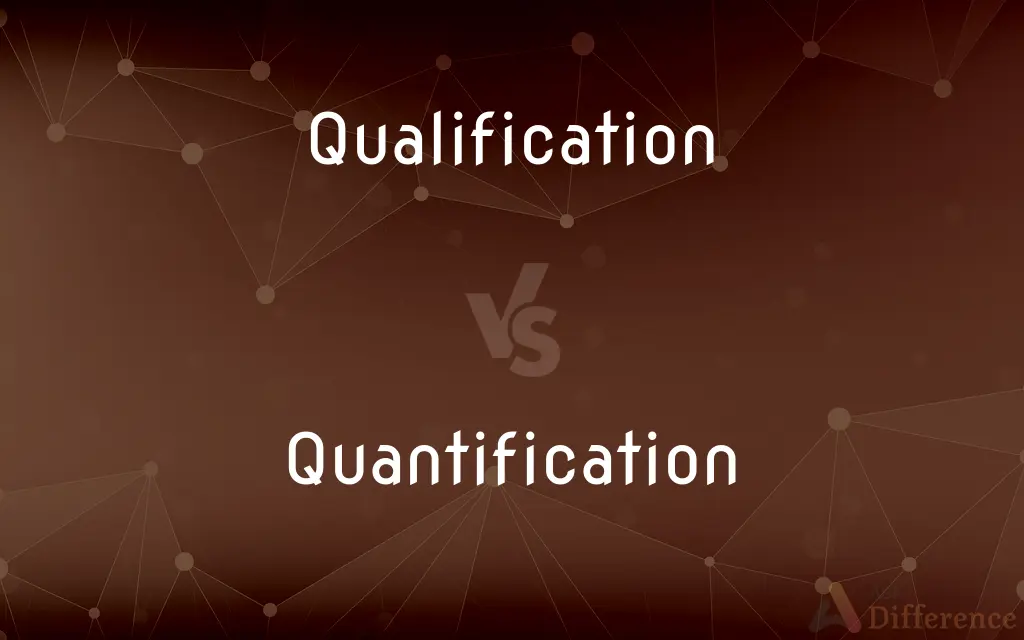Qualification vs. Quantification — What's the Difference?
By Maham Liaqat & Urooj Arif — Updated on March 25, 2024
Qualification expresses the quality or attributes of something, focusing on descriptions, whereas quantification measures or expresses quantity, emphasizing numerical values.

Difference Between Qualification and Quantification
Table of Contents
ADVERTISEMENT
Key Differences
Qualification involves describing or stating the attributes, characteristics, or quality of something, often in a subjective manner. It provides insights into the nature, type, or class of an object or concept, focusing on its inherent qualities or conditions that make it what it is. On the other hand, quantification refers to the process of measuring or expressing something in numerical terms, providing a quantitative value to describe the amount, size, or degree of something. It is objective and allows for statistical analysis and comparisons.
While qualification is essential for understanding the context, essence, and distinguishing features of a subject, providing depth and comprehension beyond mere numbers, quantification allows for the precise measurement and comparison of different entities based on standardized units. Quantification is crucial in fields like science and economics, where numerical data is fundamental for analysis and decision-making.
Qualification often comes into play in areas such as literature, philosophy, and qualitative research, where the focus is on exploring concepts, experiences, and interpretations rather than on measurable outcomes. It aids in the in-depth understanding of subjects by highlighting their unique aspects and significances. Conversely, quantification is dominant in fields like mathematics, physics, and quantitative research, emphasizing the importance of numerical data for hypothesizing, testing, and validating findings.
The process of qualification can involve subjective judgment and interpretation, making it more suited to areas where individual perspectives and in-depth analyses are valuable. Quantification, by contrast, relies on objective measurements and is pivotal in contexts where precision, consistency, and universality are required to establish facts and make informed decisions.
Both qualification and quantification are fundamental in research, analysis, and communication, serving different purposes. Qualification adds depth, context, and understanding to descriptions, while quantification offers clarity, precision, and the ability to compare and analyze data objectively.
ADVERTISEMENT
Comparison Chart
Definition
Describing the quality or attributes of something.
Measuring or expressing something in numerical terms.
Focus
Quality, attributes, nature.
Quantity, amount, size.
Dominant in
Literature, philosophy, qualitative research.
Mathematics, physics, quantitative research.
Methodology
Subjective analysis and interpretation.
Objective measurement and statistical analysis.
Importance
Provides depth and comprehension beyond numbers.
Allows for precise measurement and comparison.
Compare with Definitions
Qualification
The act of describing the qualities or attributes of something.
His qualification of the novel's theme as groundbreaking sparked a lively debate.
Quantification
Application of statistical methods to evaluate data.
Quantification of the results led to significant insights into the disease's spread.
Qualification
A condition that something must meet or comply with.
The job posting listed a degree as a minimum qualification.
Quantification
The process of expressing or measuring something numerically.
The study involved the quantification of pollution levels in the river.
Qualification
A statement or assertion, especially one that adds nuance.
Her praise for the project came with qualifications regarding its scalability.
Quantification
Making something measurable in quantitative terms.
The new software allows for easier quantification of customer feedback.
Qualification
The process of making something less absolute by considering exceptions.
His agreement came with several important qualifications.
Quantification
The use of numbers to describe or analyze something.
His approach to the problem was grounded in quantification.
Qualification
Certification or credentials that enable a person to perform a job.
She earned her teaching qualification last year.
Quantification
Assigning a numerical value to an aspect of a research study.
Quantification of the data revealed trends not initially apparent.
Qualification
The act of qualifying or the condition of being qualified
Qualification for the tournament will be hard.
Quantification
To determine or express the quantity of.
Qualification
A quality, ability, or accomplishment that makes a person suitable for a particular position or task.
Quantification
(Logic) To limit the variables of (a proposition) by prefixing an operator such as all or some.
Qualification
A condition or circumstance that must be met or complied with
Fulfilled the qualifications for registering to vote.
Quantification
The act of quantifying.
Qualification
A restriction or modification
A statement hedged with several qualifications.
Quantification
(economics) The expression of an economic activity in monetary units.
Qualification
The act or process of qualifying for a position, achievement etc.
Qualification for this organization is extraordinarily difficult.
Quantification
(logic) A limitation that is imposed on the variables of a proposition.
Qualification
An ability or attribute that aids someone's chances of qualifying for something; specifically, completed professional training.
What are your qualifications for this job?
Quantification
Modification by a reference to quantity; the introduction of the element of quantity.
The quantification of the predicate belongs in part to Sir William Hamilton; viz., in its extension to negative propositions.
Qualification
(UK) A certificate, diploma, or degree awarded after successful completion of a course, training, or exam.
Quantification
A limitation imposed on the variables of a proposition (as by the quantifiers `some' or `all' or `no')
Qualification
A clause or condition which qualifies something; a modification, a limitation.
I accept your offer, but with the following qualification.
Quantification
The act of discovering or expressing the quantity of something
Qualification
(obsolete) A quality or attribute.
Qualification
The act of qualifying, or the condition of being qualified.
Qualification
That which qualifies; any natural endowment, or any acquirement, which fits a person for a place, office, or employment, or which enables him to sustian any character with success; an enabling quality or circumstance; requisite capacity or possession.
There is no qualification for government but virtue and wisdom, actual or presumptive.
Qualification
The act of limiting, or the state of being limited; that which qualifies by limiting; modification; restriction; hence, abatement; diminution; as, to use words without any qualification.
Qualification
An attribute that must be met or complied with and that fits a person for something;
Her qualifications for the job are excellent
One of the qualifications for admission is an academic degree
She has the makings of fine musician
Qualification
The act of modifying or changing the strength of some idea;
His new position involves a qualification of his party's platform
Qualification
A statement that limits or restricts some claim;
He recommended her without any reservations
Common Curiosities
How does quantification differ from qualification?
Quantification involves measuring or expressing in numerical terms, while qualification focuses on attributes or quality.
Is qualification always subjective?
While often subjective due to its focus on qualities and attributes, it can be based on objective criteria in certain contexts.
What is an example of quantification?
Measuring the effectiveness of a new drug by the percentage of patients who recover fully.
What role does quantification play in research?
It is essential for hypothesis testing, data analysis, and validation of findings through objective measurements.
Can you provide an example of qualification?
Describing a painting as evocative and stirring due to its color palette and subject matter.
Why is quantification important?
It allows for objective measurement, comparison, and statistical analysis, which are crucial in many fields of study and industries.
How does qualification affect decision-making?
It adds depth and context, helping to make informed decisions based on qualities and conditions beyond mere numbers.
How can qualification improve the understanding of a study's findings?
It provides the necessary context, depth, and nuance, enhancing the interpretation and application of findings.
What is qualification?
The process of describing the quality or attributes of something.
Can qualification and quantification be used together?
Yes, they are often used together to provide a comprehensive understanding of a subject by addressing both its qualitative and quantitative aspects.
Can quantification be misleading?
If not used carefully, quantification can lead to oversimplification or misinterpretation of data.
Why is it challenging to quantify some aspects of research?
Some aspects are inherently qualitative and resist simple quantification due to their complexity or subjective nature.
How do qualifications impact a professional career?
Professional qualifications can enhance job prospects and credibility in one's field by certifying competencies and skills.
In what ways do qualification and quantification complement each other in analysis?
Qualification adds contextual and qualitative depth, while quantification offers precise, objective measurements, together providing a fuller understanding of a subject.
Are there fields where qualification is more important than quantification?
Yes, in fields like literature and philosophy, where understanding concepts and interpretations is more valuable than numerical data.
Share Your Discovery

Previous Comparison
Bushido vs. Seppuku
Next Comparison
Shortcake vs. ShortbreadAuthor Spotlight
Written by
Maham LiaqatCo-written by
Urooj ArifUrooj is a skilled content writer at Ask Difference, known for her exceptional ability to simplify complex topics into engaging and informative content. With a passion for research and a flair for clear, concise writing, she consistently delivers articles that resonate with our diverse audience.












































